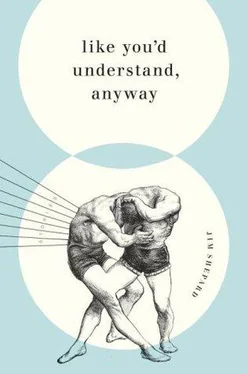Jim Shepard
Like You'd Understand, Anyway
Without crucial contributions from the following sources, many of the stories in this book would not have existed, or would have existed in a much paltrier form: Don J. Miller's “The Alaska Earthquake of July 10, 1958” and “Giant Waves in Lituya Bay Alaska;” Howard Ulrich's and Vi Haynes' “Night of Terror;” Elliott B. Roberts' “History of a Tsunami;” Lawrence Elliott's “There's a Tidal Wave Loose in Here!;” Antoine de Baecque's Glory and Terror; Regina Janes' Losing Our Heads; Olivier Blanc's Last Letters; Peter Vansittart's Voices of the Revolution; Stanley Loomis's Paris in the Terror; Rodney Allen's Threshold of Terror; Daniel Arasse's The Guillotine and the Terror; Daniel Gerould's Guillotine: Its Legacy and Lore; Barbara Levy's Legacy of Death; Simon Schama's Citizens; J. Mills Whitham's Men and Women of the French Revolution; Bettyann Holtzmann Kevles's Almost Heaven; Rex Hall and David Shayler's The Rocket Men; Nina Lugovskaya's The Diary of a Soviet Schoolgirl; Jamie Doran and Piers Bizony's Starman; Cathy Young's Growing Up in Moscow; Philip Clark's The Soviet Manned Space Program; John Herington's Aeschylus; W K. Pritchett's The Greek State at War; James Davidson's Courtesans and Fishcakes; Victor David Hanson's The Western Way of War; Bertha Carr Rider's Ancient Greek Houses; D. J. Conacher's Aeschylus: The Earlier Plays and Related Studies; Michael M. Sage's Warfare in Ancient Greece; R. E. Wycherley's The Stones of Athens; George Sfikas's Wild Flowers of Greece; Richard Lattimore's Greek Lyrics; Anthony Pod-lecki's The Political Background of Aeschylean Tragedy; Robert Flaceliere's Daily Life in Greece at the Time of Pericles; Nicholas Sekunda's Marathon 490 B.C.; Steven Pressfield's Gates of Fire; George Derwent Thomson's Aeschylus and Athens; Robert Holmes Beck's Aeschylus: Playwright, Educator; Thomas G. Rosenmeyer's The Art of Aeschylus; and, of course, Aeschylus's surviving works, in translations by Richmond Lattimore, Seth G. Benardete, David Grene, Janet Lembke, C. J. Herington, Frederic Raphael, and Kenneth McLeish. Also: Richard C. Davis' The Central Australia Expedition 1844–1846: The Journals of Charles Sturt; Jan Kociumbas's The Oxford History of Australia 1770–1860; Bernard Smith and Alwyn Wheeler's The Art of the First Fleet and Other Early Australian Drawings; Tim Flannery's The Explorers; Ken Gelder and Jane Jacobs' Uncanny Australia; Alan Moorehead's Cooper's Creek; V. M. Chernousenko's Chernobyl, Insight from the Inside; Iurii Shcherbak's Chernobyl, A Documentary Story; Grigori Medvedev's The Truth about Chernobyl; Alla Yaroshinskaya's Chernobyl: the Forbidden Truth; Alan Bowman's Life and Letters on the Roman Frontier; Nic Fields' Hadrian's Wall A.D. 122–410; G. R. Watson's The Roman Soldier; John David Breeze's Hadrian's Wall; Mingtao Zhang's The Roof of the World; Clare Harris and Tsering Shakya's Seeing Lhasa; Reinhold Messner's My Quest for the Yeti; Michel Peissel's Tibet: The Secret Continent; and Thubten Jigme Norbu and Colin Turnbull's Tibet.
I'm also grateful for the support provided by the John Simon Guggenheim Memorial Foundation, the inspiration provided by F. Andrus Burr, Paul Park, and David Wright, the expertise provided by Colin Adams, Charles Fuqua, Michael MacDonald, Rebecca Ohm, Rich Remsberg, Matthew Swanson, Robbi Behr, David Dethier, and Mike Loverink of Air Excursions, the incisive editorial intelligence of Gary Fisketjon and Liz Van Hoose, the invaluable, tireless, and long-term contributions, as readers and friends, of Steve Wright, Lisa Wright, Gary Zebrun, and Mike Tanaka, and finally, in the category of those who have read pretty much everything, the unending aesthetic and emotional support provided by Sandra Leong and Ron Hansen, and — as always — Karen Shepard.
The Zero Meter Diving Team
Guilt, Guilt, Guilt
Here's what it's like to bear up under the burden of so much guilt: everywhere you drag yourself you leave a trail. Late at night, you gaze back and view an upsetting record of where you've been. At the medical center where they brought my brothers, I stood banging my head against a corner of a crash cart. When one of the nurses saw me, I said, “There, that's better. That kills the thoughts before they grow.”
Hullabaloo
I am Boris Yakovlevich Prushinsky, chief engineer of the Department of Nuclear Energy, and my younger brother, Mikhail Vasilye-vich, was a senior turbine engineer serving reactor Unit No. 4 at the Chernobyl power station, on duty the night of 26 April 1986. Our half brother Petya and his friend were that same night outside the reactor's cooling tower on the Pripyat River, fishing, downwind. So you can see that our family was right in the thick of what followed. We were not — how shall we put it? — very lucky that way. But then, like their country, the Prushinskys have always been first to protest that no one should waste any pity on them. Because the Prushinskys have always made their own luck.
The All-Prushinsky Zero Meter Diving Team
My father owns one photo of Mikhail, Petya, and myself together. It was taken by our mother. She was no photographer. The three of us are arranged by height on our dock over the river. We seem to be smelling something unpleasant. It's from the summer our father was determined to teach us proper diving form. He'd followed the Olympics from Mexico City on our radio, and the exploits of the East German platform divers had filled him with ambition for his boys. But our dock had been too low, and so he'd called it the Zero Meter Diving Platform. The bottom where we dove was marshy and shallow and frightened us. “What are you frightened of?” he said to us. “I'm not frightened. Boris, are you frightened?” “I'm not frightened,” I told him, though my brothers knew I was. I was ten and imagined myself his ally. Petya was five. Mikhail was seven. Both are weeping in the photo, their hands on their thighs.
Sometimes at night when our mother was still alive our father would walk the ridge above us, to see the moon on the river, he said. He would shout into the darkness: he was Victor Grigoryevich Prushinsky, director of the Physico-Energy Institute. While she was alive, that was the way our mother — Mikhail's and my mother— introduced him. Petya's mother didn't introduce him to anyone. Officially, Petya was our full brother, but at home our father called him Half-life. He said it was a physicist's joke.
“Give your brother your potatoes,” he would order Petya. And poor little Petya would shovel his remaining potatoes onto Mikhail's plate. During their fights, Mikhail would say to him things like “Your hair seems different than ours. Don't you think?”
So there was a murderousness to our play. We went on rampages around the dacha, chopping at each other with sticks and clearing swaths in the lilacs and wildflowers in mock battles. And our father would thrash us. He used an ash switch. Four strokes for me, then three for Mikhail, and I was expected to apply the fourth. Then three for Petya, and Mikhail was expected to apply the fourth. Our faces were terrible to behold. We always applied the final stroke as though we wanted to outdo the first three.
Читать дальше












